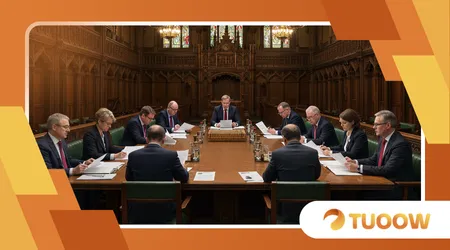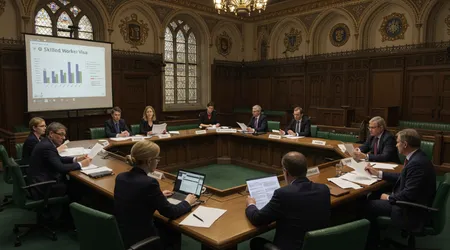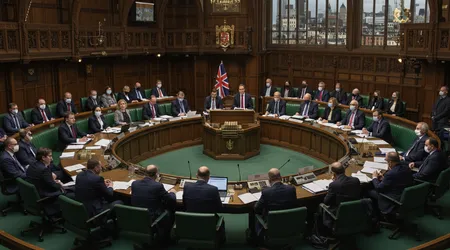UK Parliament Probes Skilled Worker Visa Policy and Sector Impacts

Skilled Worker Visas dominate headlines as the UK Parliament scrutinizes their economic and social ripple effects.
In 2025, with immigration policy under intense debate, the Home Office faces pressure to balance economic growth with domestic workforce priorities.
A recent white paper signals tighter rules, sparking discussions on how sectors like healthcare, tech, and social care will cope.
This article dives into the parliamentary inquiry, unpacking its implications with fresh insights and real-world examples. Why does this matter?
Because the decisions made now will shape the UK’s labor market for decades.
The inquiry, launched in April 2025, responds to a 37% drop in visa applications, from 1.24 million to 772,200 in the year to March, according to Home Office data.
Industries reliant on international talent are sounding alarms, while MPs question if current policies stifle growth or protect local jobs.
From care homes to cutting-edge labs, the stakes are high.
This piece explores the inquiry’s focus, sector-specific impacts, and what’s at stake for the UK’s future, blending hard facts with human stories.
The Parliamentary Inquiry: A Deep Dive into Policy
Parliament’s probe into Skilled Worker Visas seeks clarity on their role in a post-Brexit economy.
The Public Accounts Committee, building on a 2024 National Audit Office report, is examining the spring 2024 changes, including a salary threshold hike to £38,700.
MPs are asking: do these rules address labor shortages or create new ones? The inquiry also scrutinizes digital systems and compliance, aiming to curb visa abuse.
Take Dr. Aisha Khan, a Pakistani oncologist who joined an NHS trust in 2024. High visa fees and complex rules nearly deterred her, despite the UK’s cancer research needs.
Her story underscores a broader issue: restrictive policies risk repelling top talent.
++ UK Parliament Holds Final Vote on Major Data Regulation Reform Bill
The committee is gathering evidence until April 24, 2025, to assess if Skilled Worker Visas align with economic goals or hinder them.
Another angle is enforcement. The Home Office’s crackdown on non-compliant employers, especially in care, has slashed applications.
Yet, critics argue this punishes legitimate businesses. The inquiry must weigh these trade-offs, ensuring policies don’t choke off vital sectors while addressing exploitation.

Sector Impacts: Healthcare and Social Care Under Strain
Healthcare, a cornerstone of Skilled Worker Visas, faces a crisis. The Health and Care Worker visa saw applications plummet from 129,000 to 26,000 in the year to March 2025.
Care homes, already stretched, struggle to fill roles. New rules requiring a £25,000 minimum salary and proof of local recruitment efforts add hurdles.
Consider Meadowview Care Home in Leeds, where manager Sarah Collins reports a 20% vacancy rate. “We can’t find local staff, and visa restrictions block overseas hires,” she says.
Also read: UK Parliament Debates and Extends Pub Hours for 80th Anniversary of VE Day
The result? Elderly residents face reduced care quality. The inquiry must address this bottleneck to prevent a collapse in social care.
The NHS, too, feels the pinch. A leaked report warns that high visa costs deter cancer researchers, delaying trials and treatments.
Parliament’s challenge is crafting Skilled Worker Visas policies that bolster healthcare without overburdening providers with red tape.
| Sector | Visa Applications (Year to March 2025) | Key Challenge |
|---|---|---|
| Healthcare | 26,000 (down 80% from 129,000) | High visa costs, salary thresholds |
| Social Care | 8,000 (down from 26,000 quarterly) | Local recruitment mandates |
| Technology | Stable but below needs | Global talent competition |
Technology and Innovation: A Global Talent Tug-of-War
The tech sector, a driver of UK growth, relies on Skilled Worker Visas to compete globally.
Yet, the inquiry highlights a paradox: policies meant to protect local jobs may hamstring innovation.
Home Secretary Yvette Cooper’s 2024 review of tech hiring practices revealed over-reliance on international recruits due to inadequate domestic training.
Imagine a London startup, CodeZap, vying for AI engineers. Facing visa delays, it loses talent to Silicon Valley.
Founder James Patel laments, “We need Skilled Worker Visas to stay competitive, but the process is a nightmare.”
The inquiry must consider if higher salary thresholds deter small firms while favoring multinationals.
Moreover, visa costs often five figures for families deter top scientists. The UK risks losing ground in AI and biotech unless policies adapt.
Parliament’s task is aligning Skilled Worker Visas with the Industrial Strategy, ensuring startups and giants alike can thrive.
Education and Skills: Bridging the Domestic Gap
The inquiry isn’t just about visas it’s about skills. MPs are pushing for domestic training to reduce reliance on Skilled Worker Visas.
The “quad” Migration Advisory Committee, Skills England, Industrial Strategy Council, and DWP is tasked with coordinating policy. But can the UK train enough workers fast enough?
In Manchester, a tech apprenticeship program trains 50 locals annually, far short of the sector’s 10,000-job deficit. Programs like this need scaling, but funding lags.
The inquiry must explore incentives for businesses to invest in training, balancing immediate visa needs with long-term self-sufficiency.
Another issue is perception. Low pay in care and teaching deters locals, pushing employers toward Skilled Worker Visas. Raising wages could help, but who foots the bill?
Parliament’s debate will shape whether training becomes a viable alternative or remains a pipe dream.
Public Sentiment and Political Pressures
Immigration is a political lightning rod, and Skilled Worker Visas are no exception.
Public sentiment, fueled by Reform UK’s calls for a non-essential migration freeze, pressures MPs to tighten rules.
Yet, businesses and the NHS plead for flexibility. The inquiry must navigate this minefield.
Voters like Tom Harris, a Birmingham mechanic, feel torn. “I want local jobs protected, but my mum’s care home needs staff,” he says.
This tension local priorities versus global talent defines the debate. MPs risk alienating voters if they lean too far either way.
The white paper, expected soon, promises sector-specific rules. But without public buy-in, reforms could falter.
The inquiry’s success hinges on transparent communication, showing voters how Skilled Worker Visas benefit the UK without sidelining locals.
The Economic Balancing Act
Economically, Skilled Worker Visas are a tightrope. Home Office data shows only 32% of 560,000 visas from 2021-2024 went to high-skill sectors like life sciences, despite a 133,000-job need by 2030.
This mismatch stifles growth. The inquiry must realign visa allocations with economic priorities.
Think of the UK as a garden: Skilled Worker Visas are water, nourishing key sectors. Too little, and growth withers; too much, and local roots drown.
Parliament’s job is finding the right flow, ensuring visas fuel innovation without flooding the labor market.
Fiscal pressures also loom. High visa fees burden employers, yet cutting them risks public backlash.
The inquiry must weigh these costs against the economic gains of attracting global talent, a delicate but critical task.
Looking Ahead: A Path to Sustainable Policy

What’s next for Skilled Worker Visas? The inquiry’s findings, due later in 2025, will shape the white paper’s final form.
MPs must craft policies that address immediate shortages while investing in domestic skills. Flexibility is key rigid rules won’t suit a dynamic economy.
For workers like Aisha and firms like CodeZap, the stakes are personal. A balanced approach could unlock their potential, driving growth.
But missteps risk sector collapses or public unrest. The inquiry’s legacy will be its ability to thread this needle.
Long-term, integrating visas with training is non-negotiable. Sector deals, as proposed by the IPPR, could tie visa access to skills investment.
This ensures Skilled Worker Visas complement, not compete with, local workers, building a resilient labor market.
Conclusion: A Defining Moment for the UK
The parliamentary inquiry into Skilled Worker Visas is more than a policy review it’s a referendum on the UK’s global role.
Will we welcome talent or retreat inward? The 37% visa application drop signals urgency; sectors like healthcare and tech can’t wait.
Parliament must act decisively, blending economic pragmatism with public trust.
From care homes to coding hubs, the impacts are real. Aisha’s expertise, Sarah’s staffing woes, and James’s startup dreams hang in the balance.
The inquiry’s outcome will echo for years, shaping industries and lives. Stay tuned the UK’s future is being written now.
Frequently Asked Questions
What are the new rules for Skilled Worker Visas in 2025?
The minimum salary threshold rose to £38,700, with care providers needing to prove local recruitment efforts. Dependants face stricter rules, impacting applications.
How do Skilled Worker Visas affect the NHS?
High visa costs and salary thresholds deter international doctors and researchers, risking delays in treatments and trials, as seen in cancer research.
Can domestic training replace Skilled Worker Visas?
Not immediately. Programs exist, but scaling them to meet deficits (e.g., 10,000 tech jobs) requires time and funding, making visas essential short-term.
Why is the inquiry controversial?
It balances public demands for local job protection against industry needs for global talent, with political pressures like Reform UK’s migration freeze adding heat.
When will the inquiry’s findings be released?
Evidence collection ends April 24, 2025, with findings expected later in the year, shaping the upcoming Immigration White Paper.
